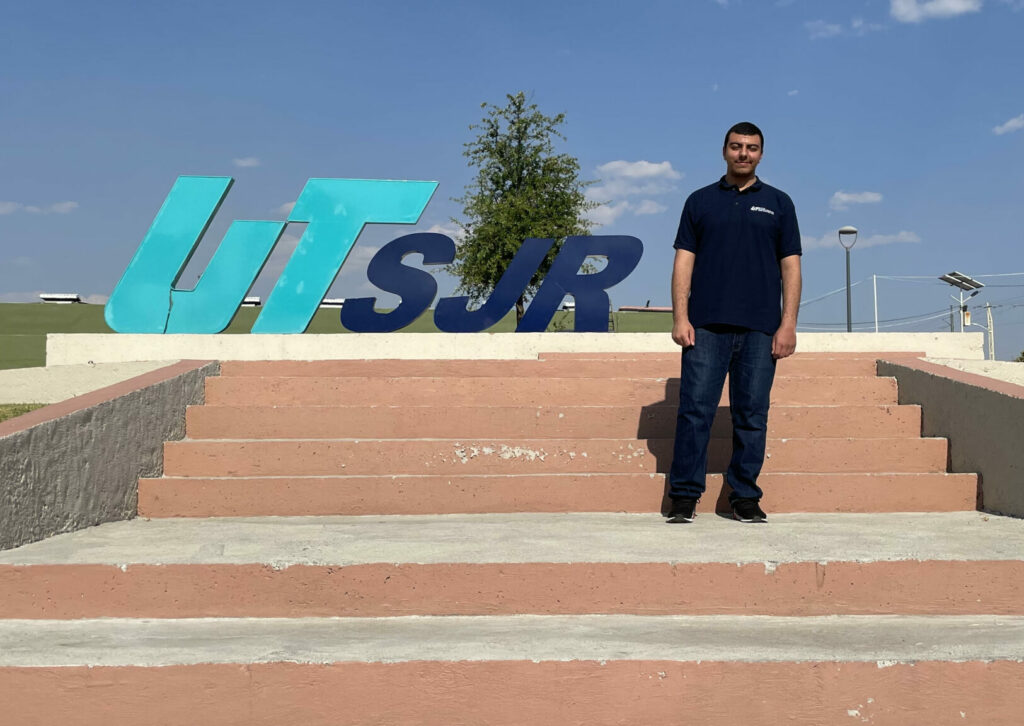
By Elaine Smith
Although he knew little Spanish, Adam Hallag, a fourth-year York electrical engineering student, jumped at the opportunity to spend a couple of months this summer as a research intern at the Universidad Tecnólgica San Juan del Rio in Mexico’s state of Querétaro.
“I wanted to have a professional opportunity to add to my resume,” said Hallag. “Once you graduate, it’s harder to get a job without some work related to your field.

“When this opportunity from CALAREO (Canadian and Latin American Research and Exchange Opportunities consortium) came through, I took it as an opportunity to go abroad to get experience while learning about another culture.”
While there, he is immersed in a project to develop the design for a closed-loop solar tracking system that uses sensor technology to adjust solar panels so that the sun rays are orthogonal to the panel, which is where maximum power is attained.
“It has been challenging, combining the work with learning Spanish and travelling alone for the first time,” said Hallag, “but I’ve learned a lot of hard and soft skills.”
Hallag is one of the first York University students to take advantage of the global research opportunities provided by CALAREO.
York membership in a consortium that includes other Canadian institutions – Carleton University, Lakehead University (secretariat), Memorial University and Vancouver Island University – meant signing a Memorandum of Understanding that commits York to facilitating and increasing student mobility, building and strengthening relations in strategic research areas, and encouraging co-operation that results in national and international grants to enhance research collaborations and training of students.
CALAREO also received funding from the federal Global Skills Opportunity fund, providing financial support that allows Canadian students who are Indigenous, low-income or have a disability to participate in these global learning opportunities, whether field study or research. In addition, CALAREO partners with Mitacs to offer undergraduate students the opportunity to undertake research abroad.
York has already taken advantage of this funding. During Reading Week in February, Alejandro Zamora, associate professor of Hispanic studies at Glendon College, led a group of 11 students to Colombia for field study as part of a course in Hispanic geopoetics; nine of the students were funded through CALAREO.
The trip, organized in collaboration with the University of Magdalena in Santa Marta, focused on the work of Gabriel Garcia Márquez, the Nobel Prize-winning poet and author who drew inspiration from the region. Students had the opportunity to work in partnership with their Colombian counterparts and become involved in community projects.
Membership in CALAREO provides York with another avenue to broaden its scope internationally – an initiative the University is actively pursuing – as demonstrated by the University Academic Plan’s commitment to advancing global engagement and its new Internationalization and Global Engagement Strategy.
The consortium currently has partnerships with Mitacs, Colombia, CONACYT (Mexico’s National Council of Science and Technology) and the Mexican state of Querétaro. As York’s engagement with CALAREO grows, the University will aim to increase the diversity of these partnerships; certainly, collaborative opportunities abound, if a recent trip to Brazil by York International (YI) team members is any indication.
In April, Helen Balderama, YI’s director of global engagement programs and partnerships, and Recep Demir, global partnerships manager, attended FAUBAI, the largest higher education conference in Latin America as part of a CALAREO delegation. Over a five-day period, the pair met with about 30 Brazilian institutions to explore new opportunities for collaboration and reciprocity.
“We have so many commonalities and explored possibilities for collaboration,” said Demir. “There was considerable interest in the International Visiting Research Trainee program, SDGs in Action and globally networked learning (GNL).
“CALAREO opened doors for us and we’re glad we came.”
Vinitha Gengatharan, assistant vice-president, global engagement and partnerships, said, “York’s increasing engagement with CALAREO is another step toward increasing York’s student and scholars’ engagement and impact in Latin America. We anticipate that membership in the consortium will be fruitful and mutually beneficial for all of the partners involved.”
Those interested in learning more about CALAREO or other ways to engage or advance your international and global priorities can contact Balderama at helencb@yorku.ca.
